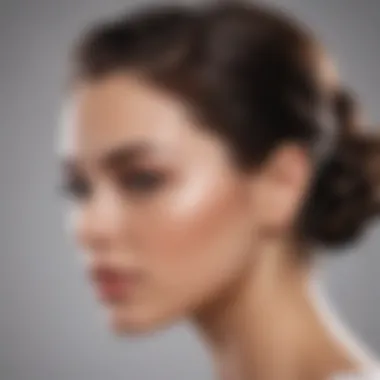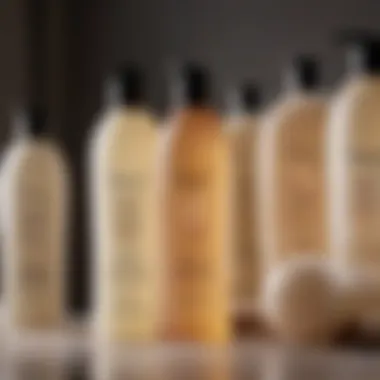Top Moisturizing Shampoos for Natural Hair Care


Intro
The pursuit of healthy, moisturized natural hair can feel overwhelming. Various products abound in the market, promising hydration and manageability. Understanding the core needs of natural hair is essential for making informed decisions, especially when selecting the best moisturizing shampoos. This aspect is crucial not only for maintaining hair health but also ensuring an overall positive hair care experience.
Natural hair typically requires additional moisture due to its structure and porosity. The right shampoo can pave the way for a more effective hair care routine, and when used correctly, it enhances the effectiveness of conditioners and styling products.
This article investigates the best moisturizing shampoos tailored for natural hair. It discusses key ingredients that contribute to hydration, and offers practical hair care routines suited for various hair types. We also explore the unique challenges faced by individuals with natural hair and how a thoughtful selection of products can address these issues.
Tips and How-Tos
Skincare Routines for Different Hair Types
Adopting a personalized hair care routine is essential. Here are some tips based on different hair types:
- Low Porosity Hair: This hair type often resists moisture. Look for lightweight, hydrating shampoos that contain humectants like glycerin.
- High Porosity Hair: A thicker moisturizing shampoo can help seal in moisture. Ingredients such as shea butter or oils are typically beneficial.
- Curly and Coily Hair: Focus on shampoos with rich, creamy formulations. They should contain ample oils and emollients to support curl definition.
Haircare and Styling Basics
To complement moisturizing shampoos, consider the following steps for looking after your natural hair:
- Cleansing: Regular cleansing is important. Choose a shampoo free from sulfates and harsh chemicals to maintain moisture levels.
- Conditioning: Follow up with a hydrating conditioner to lock in moisture.
- Styling: Opt for leave-in conditioners or creams that provide additional hydration and hold.
It's crucial to assess your hair's response to products over time. Adjustments with your care routine may be needed depending on how your hair behaves under different weather conditions or other environmental factors.
Sustainable Practices
As awareness about sustainability grows, the beauty industry has shifted toward eco-friendliness. Opting for sustainable products not only benefits individual hair health but also the planet.
Eco-Friendly Shampoo Options
Look for brands that prioritize natural ingredients over synthetic ones. Some examples include:
- SheaMoisture: Known for ethically sourced ingredients and community support.
- Aveda: Promotes environmental responsibility and plant-based formulations.
- Burt's Bees: Offers natural beauty solutions with an emphasis on sustainability.
Tips for Sustainable Grooming
In addition to choosing eco-friendly shampoos, here are practices you can adopt:
- Use Refillable Products: They reduce plastic waste.
- DIY Hair Treatments: Create your own hair masks using natural ingredients.
Celebrating Diversity in Beauty
The beauty industry is increasingly recognizing the necessity of inclusivity. Different hair types, textures, and cultural practices are all vital components in the discussion about beauty.
Inclusive Beauty Brands
Brands like Fenty Beauty and Mi Lady make strides in representation by offering products catered to a wide range of hair types and textures. It's important to support companies that prioritize diversity and inclusivity in their marketing practices.
Cultural Influences on Hair Care
Understanding how different cultures approach hair care can enhance your appreciation of its diversity. Various traditions exist around natural hair, from protective styling to the incorporation of cultural rituals in hair grooming. This recognition broadens the narrative surrounding beauty and personal expression.
"Each strand of hair tells a story – cultural, emotional, and personal."
This examination emphasizes the need for a thoughtful approach when selecting shampoos, thereby fostering appreciation for the many textures and types of natural hair.
Understanding Natural Hair
Understanding natural hair is crucial for selecting the right moisturizing shampoo. Natural hair, which is often characterized by unique textures and patterns, requires specific care routines. Recognizing these distinctive properties helps in providing better hydration and manageability. When considering products for natural hair, it’s essential to understand its needs to avoid damage and enhance its beauty.


Definition of Natural Hair
Natural hair refers to hair that has not been chemically altered through processes such as relaxing, perming, or coloring. It maintains its original texture, which can vary from straight to coiled. This hair can come in diverse curl patterns, ranging from loose waves to tight curls. By understanding its definition, you grasp the foundational aspect of hair care, setting the stage for effective treatments and product selection.
Characteristics of Natural Hair
Natural hair possesses distinctive characteristics that differentiate it from other hair types.
- Texture varies: It can be fine, medium, or coarse, and each category has a different moisture requirement.
- Porosity levels: This aspect determines how well hair absorbs and retains moisture. High porosity hair often absorbs products easily but loses moisture just as quickly, while low porosity hair resists moisture absorption.
- Curl patterns: These play a significant role in how hair behaves. Tighter curls may require more moisture than looser waves.
Recognizing these characteristics can guide one in choosing the right moisturizing products.
Common Issues Faced by Natural Hair
Natural hair often encounters unique challenges, some of which include:
- Dryness: This is a prevalent issue due to the hair structure often preventing oils from traveling down the hair shaft.
- Breakage: When not adequately moisturized, hair becomes brittle and more prone to split ends.
- Shrinkage: Though a sign of healthy, hydrated hair, excessive shrinkage can be frustrating when styling.
Understanding these issues is fundamental. It aids in choosing the best moisturizing shampoos designed to combat specific problems associated with natural hair.
"Knowledge of natural hair’s attributes shapes the foundation for effective hair care strategies."
The Importance of Moisturizing Hair Products
Moisturizing hair products are essential for maintaining the health and vitality of natural hair. Natural hair, in its true form, tends to be inherently drier than straight hair types. This dryness can lead to various problems, including brittleness and breakage. Thus, using moisturizing shampoos contributes significantly to the overall hydration of hair, which is vital for its strength and resilience.
Moisturizing shampoos not only cleanse the scalp but also infuse moisture into the hair strands. This dual action helps in restoring balance and ensuring that the hair remains soft and manageable. In contrast, shampoos without moisturizing properties may strip essential oils from the hair, resulting in excessive dryness and a dull appearance. Therefore, selecting a quality moisturizing shampoo plays a crucial role in the routine of anyone with natural hair.
Additionally, these products often contain specific ingredients that target moisture retention. Ingredients such as essential oils, natural butters, and hydrating agents are key in developing products that not only wash the hair but also provide necessary moisture to combat environmental factors that contribute to dryness. As people navigate extreme weather conditions and varying humidity levels, the importance of a well-formulated moisturizing shampoo cannot be overstated.
Factors Influencing Moisture Retention
Several factors influence how well hair retains moisture. Firstly, the hair porosity level plays a significant role. Hair with high porosity tends to absorb moisture easily but also loses it just as quickly. Conversely, low porosity hair might resist moisture intake, making it challenging to achieve hydration. Therefore, understanding the porosity level can help in selecting the right moisturizing products suited for specific hair types.
Secondly, hair texture impacts moisture retention. Curly and coily hair types often struggle to maintain moisture due to their structure. The natural oils produced by the scalp have difficulty traveling down the hair shaft, causing the ends to become dry. This further emphasizes the need for moisturizers in hair care routines. Using products that target this unique structure can significantly improve how much moisture the hair retains.
Lastly, environmental factors such as humidity, temperature, and exposure to harsh elements affect hydration levels. Hair exposed to dry climates or frequent heat styling may require more intensive moisturizing care to counteract the effects of such conditions.
Consequences of Dry Hair
Dry hair can lead to multiple adverse effects that impact both appearance and overall hair health. One of the most noticeable consequences is breakage. When hair lacks moisture, it becomes brittle and vulnerable, leading to fragmented strands that can hinder growth and overall length retention. Consequently, managing hair becomes significantly more challenging, requiring more frequent trims and products to combat damage.
Moreover, dry hair can lead to an uneven texture. Hair may feel rough and appear frizzy, detracting from the natural beauty of the curls or waves. This condition not only affects how the hair looks but also how it behaves. Manageability decreases, making styling more arduous and time-consuming.
Additionally, dry hair may lead to issues such as an itchy scalp or dandruff. The lack of moisture can make the scalp uncomfortable, which might contribute to irritation and flakiness. This can further exacerbate hair loss and affect the appearance of the hair.
In summation, understanding the importance of moisturizing hair products is critical for the maintenance of natural hair. By recognizing the factors that influence moisture retention and the consequences of dryness, individuals can make educated choices for more vibrant and healthier hair.
Key Ingredients in Moisturizing Shampoos
Selecting the right moisturizing shampoo is essential for maintaining the health of natural hair. The effectiveness of these products largely depends on their ingredients. Understanding key components helps consumers make informed choices tailored to their unique hair needs. Here, we focus on essential oils, natural butters, and hydrating agents. Each has distinct benefits and considerations in the context of moisturizing shampoos.
Essential Oils
Essential oils are concentrated plant extracts known for their beneficial properties. When incorporated into shampoos, they often enhance hydration and hair health. Some common essential oils include tea tree oil, argan oil, and lavender oil. These oils possess unique attributes:
- Tea Tree Oil: Known for its antifungal and antibacterial properties, it helps combat scalp issues like dandruff while promoting a healthy environment for hair growth.
- Argan Oil: This oil is rich in fatty acids and vitamin E. It effectively moisturizes and adds shine without weighing down the hair.
- Lavender Oil: It is recognized for its calming fragrance and may contribute to scalp circulation, indirectly supporting hair growth.
Using shampoos with these oils can help infuse moisture into dry curls. However, it’s essential to verify the quality of the oils used, as synthetic versions do not provide the same benefits.
Natural Butters


Natural butters, including shea butter and cocoa butter, serve as excellent moisturizing agents. They provide deep hydration and can improve the manageability of natural hair. Here are the significant points:
- Shea Butter: This butter is rich in vitamins A and E. It helps to restore moisture balance, making hair softer and more pliable. It is particularly beneficial for coarse or textured hair types.
- Cocoa Butter: Known for its emollient properties, cocoa butter forms a protective barrier over the hair. This helps to retain moisture and protect against environmental damage.
When selecting shampoos, look for those that highlight these butters in their ingredients. They can greatly enhance the hydration levels in natural hair, making it more vibrant.
Hydrating Agents
Hydrating agents play a vital role in moisturizing shampoos. They help to draw moisture into the hair shaft and prevent water loss. Ingredients like glycerin and aloe vera are commonly used for this purpose:
- Glycerin: A natural humectant, glycerin attracts moisture from the environment. It helps keep hair hydrated, particularly in humid conditions.
- Aloe Vera: This plant extract is known for its soothing properties. It moisturizes and conditions, making hair easier to detangle. Additionally, aloe vera can provide cooling relief to irritated scalps.
Choosing shampoos with these hydrating agents is key for achieving soft, manageable hair. They effectively combat dryness, a common concern for natural hair.
"Hydration is not just an occasional treatment; it should be an integral part of your hair care routine."
In summary, knowing the importance of these key ingredients can guide consumers in selecting the right moisturizing shampoos. Each ingredient contributes uniquely, complementing the specific needs of natural hair. This understanding deepens the connection to hair care, moving beyond mere branding towards informed choices.
Evaluating Moisturizing Shampoos
Evaluating moisturizing shampoos is crucial when it comes to the overall health of natural hair. The right shampoo not only cleanses but also replenishes moisture, which is essential for maintaining vibrant and strong hair. Natural hair can be susceptible to dryness, frizz, and damage, making it imperative to choose a shampoo tailored to meet its unique needs. By examining the ingredients, benefits, and overall quality, consumers can make informed choices that result in healthier hair.
Understanding Labels and Ingredients
Understanding labels and ingredients is the first step in evaluating moisturizing shampoos. Many products claim to be moisturizing or hydrating, but not all deliver the same results. Here are some key elements to look for when reading labels:
- Moisturizing Agents: Look for ingredients like glycerin, aloe vera, or panthenol, which are known to attract and retain moisture.
- Sulphates: These are often harsh detergents. Opt for sulphate-free shampoos that cleanse without stripping the hair's natural oils.
- Natural Oils and Butters: Ingredients like shea butter, coconut oil, or argan oil provide nourishment and enhance moisture retention.
- Additives: Be cautious of additives like artificial fragrances and colors, which may irritate the scalp or hair.
Understanding these aspects helps ensure that the chosen shampoo aligns with the specific needs of natural hair care.
Identifying Quality Products
Identifying quality products is equally important in the evaluation process. Here are some considerations to keep in mind:
- Brand Reputation: Established brands often have a track record of quality. Researching customer reviews and testimonials can provide insight into product performance.
- Formulation: Check the formulation to determine whether it contains a good balance of hydrating ingredients and gentle cleansers. A well-balanced product supports hair health without excess buildup.
- Price Point: While higher price does not always mean better quality, ultra-cheap options may lack essential ingredients. Aim for a reasonable compromise between cost and quality.
- Transparency: Brands that clearly list their ingredients and provide rationale for their inclusions tend to exhibit trustworthiness.
Evaluating moisturizing shampoos is a fundamental aspect of maintaining natural hair. With knowledge of labels, quality indicators, and an understanding of ingredients, individuals can empower themselves to choose wisely.
"Choosing the right moisturizing shampoo lays the groundwork for healthy, manageable hair."
Each step in this process contributes to a broader understanding of how to meet the specific needs of natural hair, leading to informed decisions and ultimately healthier hair.
Recommended Moisturizing Shampoos for Natural Hair
In the quest for maintaining healthy and vibrant natural hair, selecting the right moisturizing shampoo is essential. This section focuses on how to choose the best moisturizing shampoos, diving into specific products that cater to various needs. Proper hydration is vital for natural hair as it is often more prone to dryness due to its structure. High-quality moisturizing shampoos can help combat this issue effectively while providing additional benefits such as increased manageability and shine.
Top Rated Products
When looking for effective moisturizing shampoos, several products stand out due to their formulations and results. These shampoos have received positive acclaim from users and experts alike for their ability to hydrate and restore natural hair. One highly recommended product is the SheaMoisture Raw Shea Butter Moisture Retention Shampoo. It contains shea butter and provides essential moisture without stripping the hair of natural oils. Another excellent choice is the Cantu Shea Butter for Natural Hair Sulfate-Free Cleansing Cream Shampoo. Its sulfate-free formula avoids harsh chemicals, ensuring an effective cleanse without drying the scalp or hair.
Other notable options include Maui Moisture Heal & Hydrate + Shea Butter Shampoo and Aussie Miracle Curls Shampoo. These products cater to those seeking deep hydration while emphasizing curl definition as well. The inclusion of natural ingredients like coconut oil and hibiscus flower extracts makes these shampoos not only effective but also gentle.
Budget-Friendly Options
Finding high-quality moisturizing shampoos does not have to be costly. There are several budget-friendly options that still provide excellent hydration. One such option is Palmers Coconut Oil Formula Shampoo. This shampoo offers a rich moisturizing experience without a hefty price tag. Another good choice is V05 Moisture Milk Shampoo, which is known for being affordable while still delivering hydration and softness.
Lastly, Herbal Essences Hydrate Coconut Shampoo is a great choice. It's readily available, easy to find, and does a commendable job of nourishing the hair and scalp. These budget-friendly shampoos prove that effective hair care can be achievable without overspending.
Premium Choices
For those who are willing to invest more into their hair care regimen, premium shampoos can offer luxurious experiences and exceptional results. Products like Oribe Gold Lust Repair & Restore Shampoo are celebrated for their rich formulations that blend natural extracts with botanical oils. This shampoo repairs and revitalizes the hair while improving moisture levels significantly.


Briogeo Don’t Despair, Repair! Super Moisture Shampoo is another premium choice. Designed with a blend of natural ingredients, it targets dryness, ensuring every strand is hydrated from root to tip. Also, Kerastase Nutritive Bain Satin 2 Shampoo is renowned for its smoothing properties and is suitable for normal to dry hair. It not only cleanses but also nourishes the hair deeply, creating a healthy shine.
Proper selection of a moisturizing shampoo aligns with the unique needs of your natural hair. Investing in the right product can lead to long-term health and manageability of your hair.
In summary, whether you are looking for top-rated products, budget-friendly options, or premium choices, there exists a moisturizing shampoo that can meet your unique needs. The key is to examine the ingredient list and understand how each product aligns with your hair goals.
Incorporating Moisturizing Shampoos into Your Routine
Incorporating moisturizing shampoos into your hair care routine is essential for maintaining the health and vitality of natural hair. It is not just about washing your hair; it involves understanding the unique needs of your hair type and how moisturizing products can serve those needs effectively. Proper hydration ensures that your hair remains soft, manageable, and vibrant.
When you choose a moisturizing shampoo, it acts as the first step in your hair care regimen. The right formula will cleanse while replenishing moisture, setting the foundation for further hydration. This can help prevent dryness and breakage, keeping your curls defined and healthy.
Consistent Washing Schedule
Establishing a consistent washing schedule is crucial for optimal hair health. Washing your hair too infrequently can lead to product buildup and dryness, whereas washing it too often can strip away natural oils. The key is to find a balance that works for your specific hair type.
Natural hair generally benefits from washing once a week or every ten days. This allows enough time for moisture to penetrate without risking excessive dryness. During your wash days, use a moisturizing shampoo to cleanse and hydrate at the same time. The goal is to keep your curls soft and well-nourished.
Complementary Products
To enhance the effectiveness of moisturizing shampoos, consider incorporating complementary products into your routine.
- Conditioners: A quality moisturizing conditioner should follow your shampoo. It can help lock in moisture and provide additional benefits like detangling and smoothing the hair cuticle.
- Leave-In Treatments: A leave-in conditioner can add further hydration and protection against environmental factors. This is especially beneficial for those with tight curls.
- Hair Oils: Using oils such as jojoba or argan can nourish and seal in moisture, keeping your hair healthy in between washes.
In summary, integrating moisturizing shampoos into your routine requires a consistent approach and the use of complementary products. This holistic method can lead to more resilient and vibrant natural hair.
"Healthy hair is not just well-washed; it is properly nourished and maintained."
Adopting this practice will enable you to maximize the benefits of moisturizing shampoos, giving your hair the care it deserves.
Signs Your Hair Needs Moisturizing Shampoo
Recognizing when your hair needs a moisturizing shampoo is vital for maintaining the health and vitality of your natural hair. Regularly monitoring the condition of your hair can save you from long-term damage and ensure it remains manageable. Moisturizing shampoos are designed to replenish moisture, enhance softness, and improve overall hair appearance. Identifying the signs that your hair requires these products should be an integral part of your hair care routine.
Physical Indicators
There are several physical indicators that can signal your hair's need for moisture. Here are some key signs to watch out for:
- Dryness: When your hair feels dry to the touch, lacks shine, and appears dull, it indicates a lack of moisture. Dry hair can be fragile and more prone to breakage.
- Frizz: Excessive frizz is often a clear sign that your hair is lacking hydration. When hair cuticles are open due to dryness, it absorbs moisture from the air, causing frizz and flyaways.
- Brittleness: Hair that breaks easily is a cause for concern. Brittle hair often results from insufficient moisture and can lead to split ends and major hair loss if not addressed.
- Lack of Elasticity: Healthy hair should stretch without breaking. If your hair lacks elasticity and snaps easily when pulled, it may be in desperate need of hydration.
Paying attention to these physical indicators can help you make timely decisions about incorporating a moisturizing shampoo into your hair care regimen.
Texture Changes
Another significant aspect to consider is texture changes. Your hair's texture can change over time due to various factors, and these changes can signal that it needs more moisture:
- Coarseness: If your normally smooth hair feels coarse and rough, it signals moisture loss. Hair might become stiff and unmanageable, indicating the need for a hydrating shampoo.
- Uneven Texture: An uneven texture, where some strands feel softer while others feel dry, can indicate that your hair is not receiving adequate moisture. This inconsistency can reflect the need for a suitable moisturizing product.
- Tangled Hair: Increased tangling and difficulty in achieving a smooth hairstyle often suggest that your hair is dry and in need of hydration. Tangles can lead to further hair damage if not addressed.
Recognizing these texture changes can provide insightful cues about enhancing your moisturizing hair care routine. Each of these indicators plays a significant role in ensuring that your hair remains healthy, vibrant, and manageable.
Closure
In essence, moisturizing shampoos serve as a foundation for proper hair care routines. These products should be integral to any regimen, as they help prevent dryness, tangling, and breakage. Proper hydration leads to a well-nourished scalp, which is essential for hair growth and overall hair condition. This approach aims at reducing stress on hair and enhancing resilience against environmental factors, thereby supporting long-term health.
Furthermore, the ability to recognize when your hair needs moisture is essential. The physical indicators and texture changes discussed earlier are crucial signals. Ignoring these signs can lead to complications that require more intensive intervention.
The benefits of moisturizing shampoos extend beyond immediate results. By investing in quality products and establishing a dedicated care routine, one can achieve lasting results. Natural hair takes time to nurture. Patience and consistency are rewarded with vibrant and well-managed hair.
"Choosing the right moisturizing shampoo is a critical step in achieving healthy, beautiful natural hair."
Final Thoughts on Hair Care
Hair care is a personal journey, especially for those with natural hair. The unique needs of each individual require a tailored approach. This article highlights that there is no one-size-fits-all solution. Each person must evaluate their own hair type, condition, and lifestyle.
Ultimately, prioritizing hydration will lead to healthier hair. A consistent regimen involving moisturizing shampoos, alongside complementary products, creates a balanced care strategy. Emphasizing quality ingredients further enhances the effectiveness of your hair care routine.
Understanding how to properly care for natural hair is empowering. With the right knowledge and product choices, it is possible to enjoy beautiful, manageable hair that reflects one's personality and style.







